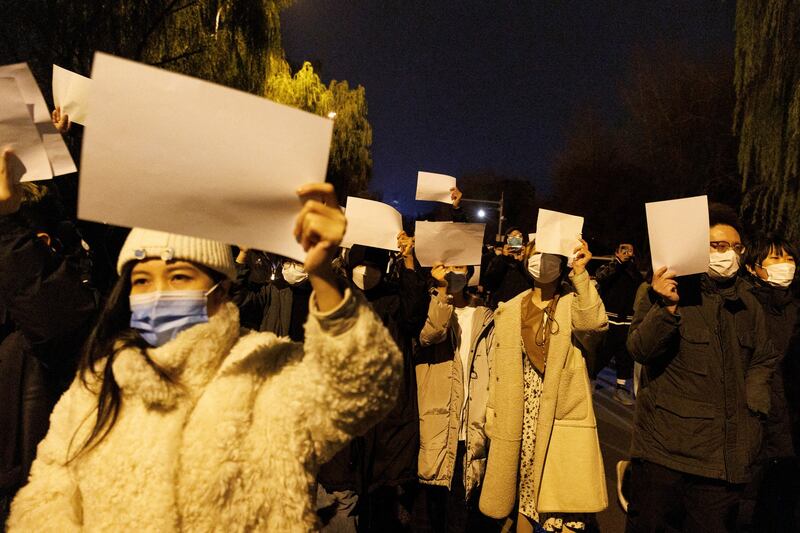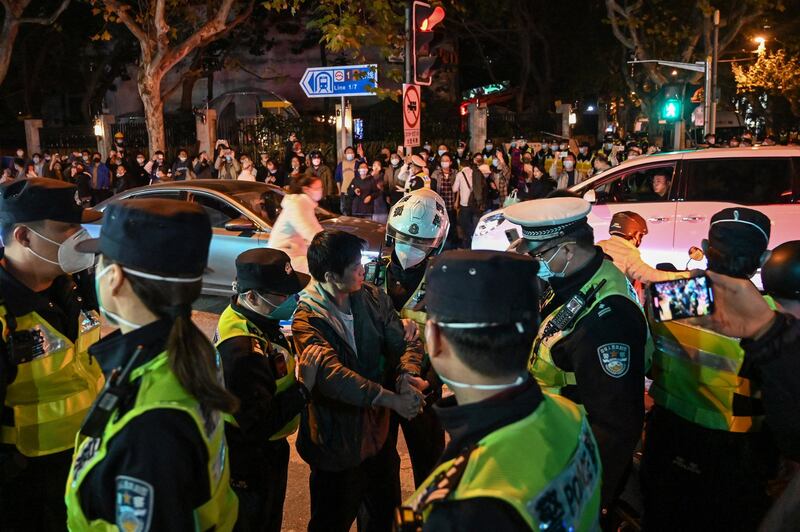One year after crowds of protesters across China held up blank sheets of paper, chanting slogans calling for an end to the zero-COVID policy and for President Xi Jinping to step down, many who took part in the " white paper" movement have fled overseas.
Chinese authorities moved quickly to quash the protests, arresting a number of young people for taking part.
Among them was Huang Guoan, a 30-year-old software programmer who had attended a protest in the southern city of Guangzhou, where he was living at the time.
Huang, who had been making plans to leave China, was taken to a detention center where police accused him of spreading an essay criticizing the ruling Chinese Communist Party published on a website run by the banned Falun Gong spiritual movement.
During his 15-day detention, Huang cooperated with police and "confessed" following repeated interrogations during which he was tortured with sleep deprivation through bright lights, and with pepper spray, he said.
"The light is so strong you can't block it out even if you shut your eyes," Huang told RFA Mandarin in a recent interview. "It's still red and dazzling."
The lights also affected Huang's daytime vision, he said.

"It's difficult for your eyes to recover even after a whole day – it's pitch black and very frightening, and you feel like you're blind," he said.
"As for the pepper spray, it's very painful, and you don't recover from it for a long time, even if you drink some water," Huang said.
Starvation diet
Now a political asylum-seeker in New Zealand, Huang said his motivation for joining the "white paper" movement stemmed from the suffering he witnessed and the hardship he endured while under lockdown during the "zero-COVID" era that ended shortly after the "white paper" protests in late November 2022.
Huang, who once pulled in a good salary as a project manager and software engineer for state-owned China Southern Power Grid, said he never thought he would ever be forced to the edge of starvation.
"It was October 2022," he said. "My Health Code had turned red, which happened if your phone had gotten close to someone who also had a red code."
"The pandemic enforcers would use that to lock you up in your own home," Huang said. "I had stored mostly rice, so I eked out a small bag of rice for more than a month."
"By the end of that month, I was eating thinner and thinner congee, and I knew that in just a few days, I would go hungry," he said, adding that calling emergency services or municipal helplines didn't get him anywhere, as the people who answered citing lack of supplies as a reason not to supply him with food.
Huang also remembered witnessing a suicide attempt by a man on the streets of downtown Guangzhou.
"I saw a guy, a white-collar worker, who had jumped straight off the building," he said. "I didn't see him actually jumping – I just saw him lying on the ground covered in blood."

"The police had cleared and cordoned off the area within about 20 minutes, and they were telling people to delete any video or photos from their mobile phones and WeChat accounts."
"Anyone who did post something online would soon have been discovered by the Internet police, and then their account would be blocked," Huang said.
The Chinese health ministry refused in November 2022 to publish statistics on suicides under the country's zero-COVID policy of rolling lockdowns and electronic tracking.
Circumventing the Great Firewall
Despite government information blackouts and constant online censorship, young people in China were finding ways to circumvent the Great Firewall and get a more realistic picture from outside the country's tightly controlled internet content, he said.
Shaken out of his expectation of privilege and comfort by the privations of lockdown, Huang joined a WhatsApp anti-lockdown group that had around 500 members, and started posting any information he found online to the group.
The posts were historical, about the kangaroo courts and political killings of the turbulent Cultural Revolution era from 1966-1976, but also about more recent scandals, including trafficking in children, organ harvesting and forcible demolitions and land grabs by local officials.
As crowds started to gather in the wake of a fatal lockdown fire in Xinjiang's regional capital Urumqi, Huang started printing flyers containing links from his posts, and handing them out on the streets of Guangzhou, packaging them as entertainment or gambling websites.
He said online discussions about opposition to Xi's zero-COVID policy soon erupted into real-world action.
"Everyone went out to bang on the locks and break through the fences," Huang said in a reference to the fencing and welding used by COVID-19 enforcers to confine people to their homes and residential neighborhoods.
"The police were very violent at that time," he said. "I watched from behind at a close range."
"The police used iron rods and electric batons to smash people's heads – they fell to the ground," Huang said. "The people at the front must have been arrested on the spot."
One by one, the friends who stood alongside Huang in the back row of the protests fell silent, presumed detained.

Huang started to make plans to leave China, and received his visa for New Zealand in early May, just before he was detained and interrogated, he said.
In July, after his release, Huang boarded a flight to New Zealand. A few days later, police descended on his former home in Guangzhou, searching it from top to bottom and issuing an arrest warrant for him.
The warrant told Huang that they knew he was already in New Zealand, and called on him to come back to China and turn himself in immediately in order to "protect himself and his family."
Since then, Huang's colleagues, friends and younger brother have all been hauled in for questioning, while a bank account containing 380,000 yuan (US$53,600) has been frozen, he said.
Huang's attorney Alan Williams confirmed that his client has submitted an application for refugee and protected status in New Zealand, adding that he will be interviewed before next June.
Due to a large backlog of applications this year, the approval process could take up to 12 months, he said.
In the meantime, an organization in Auckland has been helping him get set up with rented accommodation and starting to look for a job, he said.
According to Huang, the number of Chinese nationals seeking political asylum in New Zealand has risen sharply since the start of the pandemic, with an approval rate of around 50% currently reported.
Translated by Luisetta Mudie. Edited by Malcolm Foster.
